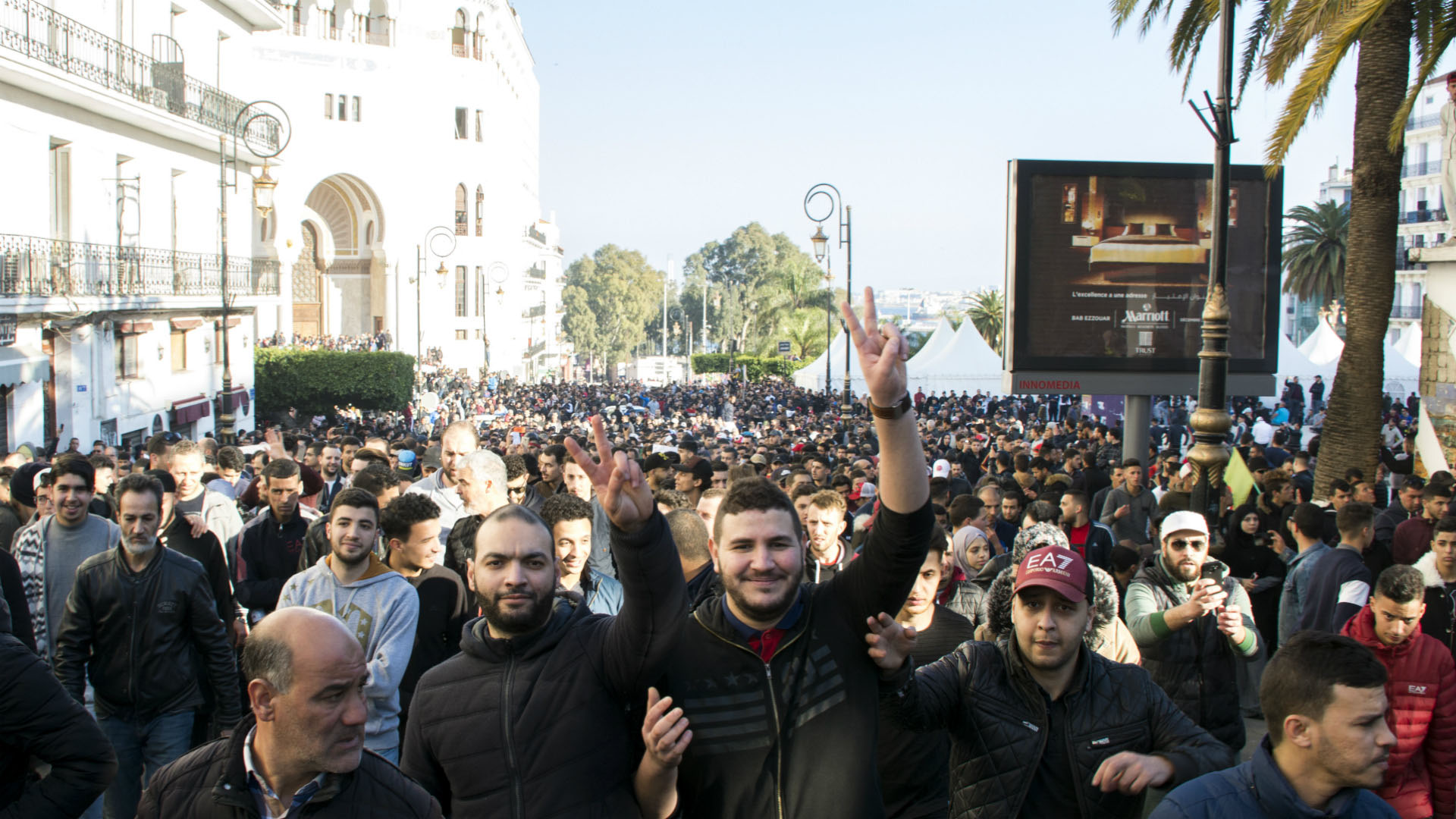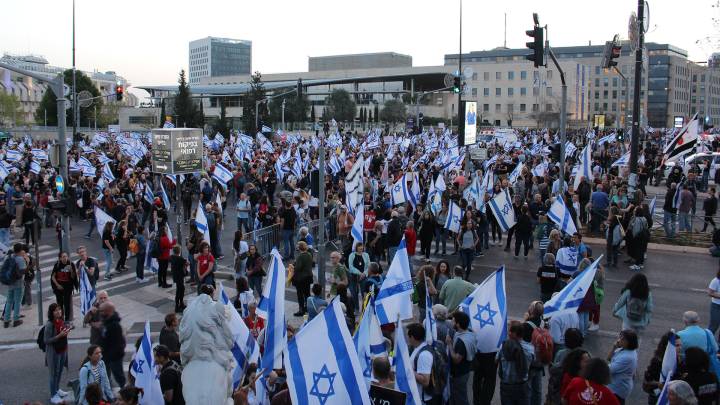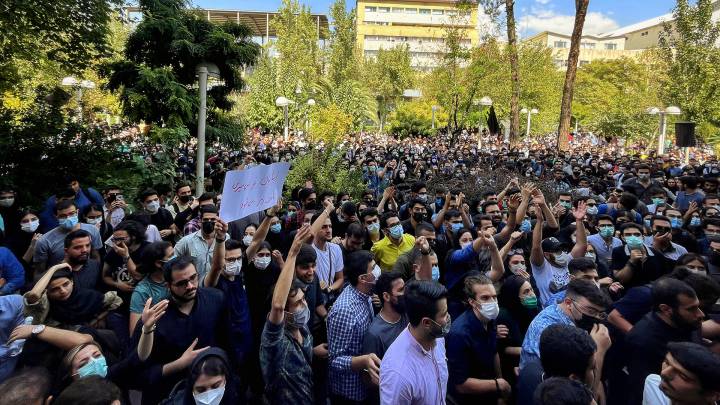The intelligence services, by taming the media outlets and opposition parties, have broken an attempted democratic transition in Algeria.
The Algerian regime’s habits remain unchanged, despite ten months of mass protests. This period was long enough for the regime to dust itself off and to once again take up the reins of power which had been weakened by a battle of nerves stemming from distribution of rent during President Bouteflika’s final term.
On 17 December 2019, two day before handing over power to the new President, Abdelmajdid Tebboune, the acting head of state, Abdelkader Bensalah signed a decree, which was published in Algeria’s official gazette.
It mandated the reinstatement of powers of the Directorate of Security Services (DSS), previously known as DRS, after they were undermined by the recently deposed former President Abd al-Aziz Bouteflika. The directorate was previously used to direct political and media work, by ringfencing it from pending investigations into corruption. Algerians now found themselves having to deal directly with the military leaders as the de facto ruling power after Bouteflika’s overthrow in April last year. They are the ones who want to take control of the DSS. The DSS powers resembled those of a secret police: infiltrating political parties, intervening in the approval of journalists and the media, and running client networks that control the conduct of public and private advertising to influence political and media practices. All of which was done to protect the regime.
The organisation was originally tasked with counter-intelligence, but of course, as with intelligence agencies the world over, it undertakes outright intelligence activities in both politics and the media. The exception in Algeria is that the military is performing these activities to protect their own interests, to the detriment of the those of the state itself. In doing so it has devasted politics and the media to such an extent that it threatens the very existence of the Algerian nation.
Bensalah issued a degree to free the intelligence service from the controls that Bouteflika had imposed upon it
The intelligence service, by taming media outlets and opposition parties, has broken an attempted democratic transition in Algeria. It has sought to restore what Bouteflika deprived them of during his tenure. Also the review of their powers two days before the new President’s inauguration sends a clear message to him that affairs of the intelligence service should not be interfered with. Bouteflika limited the intelligence service’s powers in 2014 to addressing issues of “regional security, terrorism, sabotage and organised crime”.
This meant that it was only to preoccupy itself with “prevention of crime with new forms of information and communication technology, tackling activities of international criminal organisations that aim to compromise national security, prevention of incidents of sabotage or hostility that is aimed at state institutions, and deterrence of any type of foreign inference.” Bouteflika also gave the judiciary oversight over the intelligence service, obligating it to meet certain legal criteria when collecting evidence. Bensalah issued a degree to free the intelligence service from the controls that Bouteflika had imposed upon it and he gave it the possibility of opening preliminary investigations into anything before judicial investigations began.
The Algerian regime, in fact, renewed its facade by holding elections in which the majority of Algerians did not participate. And in doing so it has railed legions to its cause, who took to the streets in support of circumstantial gains according to the system’s logic. The intelligence service has always imposed this system defined by the unwritten rules of obedience and loyalty. While others who continue to call for freedom and the rule of law, remain a sizeable presence in public spaces seeking to change the political rulebook and to ensure that a new state is built.
The elections held on 12 December last year deeply divided Algerians
The demand was encapsulated by a slogan that protesters chanted every Friday: “We carry on peacefully and get the military out of El Mouradia” (We will continue protesting by peaceful means until we remove the military from the Presidential palace to exclude them from political decision-making). This resulted in the de facto authority cracking down on protests, which was characterised by a large campaign of arrests of political and civil society activists and culminated in the appointment of one of Bouteflika’s former ministers, Abdelmajdid Tebboune, as President.
The elections held on 12 December last year deeply divided Algerians. The election turnout did not reach 40% with many of the inhabitants of Kabylie boycotting them all together. Only nine out of the 700,000 people on the electoral roll in Tizi Ouzou voted and only 1,000 of the 600,00 registered to vote in Béjaïa before polling stations closed for fear of violence.
The 74-year-old Tebboune, who appeared to have left politics in 1991, re-entered the political arena as Minister of Communication in Ahmed Benbitour’s government when Bouteflika was elected President in 1999. He was then Minister Delegate responsible for the Ministry of Interior and local communities from June 2000 until May 2001 in Ali Benflis’ first government. He also held a position in Benflis’ second government as Minister for Housing and Urban Affairs from May 2001 to June 2002. His career peaked during Bouteflika’s final two terms when he again became Minister for Housing and Urban Affairs from 2012 to 2017, when he had a three-month-long stint as prime minister before resigning because of a dispute with Ali Hadad, the President of the Business Leader Forum, who is currently serving time in prison on corruption charges.
The new President appointed a government made up of 39 ministers
The appointment of Tebboune, who graduated from the National School of Administration in Algiers in 1969, comes after a long career in state administration. Tebboune served as head of many different departments before becoming mayor of several cities including Adrar, Tiaret and Tizi Ouzou. Between June 1991 and February 1992, he was Minister Delegate to the influential Minister of Defence, Larbi Belkheir, who was known as “the Cardinal”.
In short, these elections were meant to legitimise the regime and their proxies getting their house back in order and regaining their nerves. One clique has simply dislodged another and is now working to consolidate its influence throughout state institutions by obtaining appointments at all levels. These appointments began before the elections inside the army and the state security, the judiciary and public companies. The operation reached the institutional structures themselves to produce a façade that is a faded copy of what is was under the deposed President.
The new President appointed a government made up of 39 ministers, comprising ministers who had served under Bouteflika and those who were appointed in the days leading up to his overthrow. Tebboune has also appointed new faces, some of whom had been associated with the Hirak, the popular anti-regime movement. Unlike in previous years, there has as yet been no minister or deputy Minister of Defence appointed as part of this government. This has occurred in the context of the death of General Ahmed Gaid Salah, the former deputy of defence and commander of the armed forces, who brought about this change. A statement from the current Algerian cabinet stated that the President was in charge of the Ministry of Defence.
After the death of Salah, the mystery surrounding the Ministry of Defence remained
Surprisingly, the four days after the inauguration of the new President were not enough for the military to agree on appointing a new official. Then things proceeded as normal with the appointment of the Head of Army, as Major General Said Chengriha was appointed Salah’s successor. However, after the death of Salah, who had combined the post of interim President with than of the Minister of Defence, the mystery surrounding the Ministry of Defence remained.
The Presidency then issued a statement that appointed Chengriha as chief of staff of the armed forces and minister of defence, who, according to the constitution, is the highest-ranking member of the Armed Forces and responsible of the nation’s defence. When the formation of the government was announced, Chengriha was not mentioned, suggesting that he had maintained his post. The Ministry of Defence published a picture of the leader of the Armed Forces on behalf of Chengriha in which he is giving a speech to his theoretical inferiors, such as provincial governors and heads of the various departments of the Ministry of Defence, as though to announce himself as the new minister.
The announcement of the formation of a new government did not weaken the resolve of the protestors who took to the streets of the Algerian capital in their thousands and occupied squares throughout the country. Some supporters of the anti-regime protestors took to social media to praise their friends’ appointments as ministers and others on the streets gave their blessings to some ministerial appointees.
Many of the prisoners of conscience still languish in prison
But the reception to this announcement which coincided with the day that authorities released prisoners of conscience most of whom had finished their sentences. Several were placed in pretrial detention in which their freedom is restricted until they face trial, including the former National Liberation Army (FLN) commander Lakhdar Bouregaa, who was arrested in June for allegedly criticising the military. State media channels marketed this as a measure designed to calm the political situation which remains unresolved by elections which had been called against the popular will.
Popular protests therefore continue and according to those interviewed, it seems like the protestors remain convinced the problem is not simply one of personnel. They believe that nothing will change without a complete overhaul of the unwritten rules of the political game by which the military gets to decide who gets certain positions and rents.
Every political act in the current circumstances, whether through existing parties or parties created within the framework current legal system, is doomed to fail. Such acts merely contribute to the renewal of the regime and no change is forthcoming without freeing public spaces from the media and political parties. The protesters feel that there is no chance to change the course of the system except in the streets, which is the only place that freedom can, at a high cost, be expressed. Many of the prisoners of conscience still languish in prison for supposedly inciting unarmed gatherings, expressions of freedom of assembly which remains outlawed in Algeria.
This article was first published in Daraj magazine




